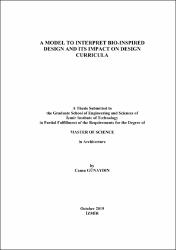Please use this identifier to cite or link to this item:
https://hdl.handle.net/11147/9643Full metadata record
| DC Field | Value | Language |
|---|---|---|
| dc.contributor.advisor | Doğan, Fehmi | - |
| dc.contributor.advisor | Kasalı, Altuğ | - |
| dc.contributor.author | Günaydın, Cansu | - |
| dc.date.accessioned | 2020-08-28T07:32:19Z | |
| dc.date.available | 2020-08-28T07:32:19Z | |
| dc.date.issued | 2019-11 | - |
| dc.identifier.citation | Günaydın, C. (2019). A model to interpret bio-inspired design and its impact on design curricula. Unpublished master's thesis, İzmir Institute of Technology, İzmir, Turkey | en_US |
| dc.identifier.uri | https://hdl.handle.net/11147/9643 | - |
| dc.description | Thesis (Master)--Izmir Institute of Technology, Architecture, Izmir, 2019 | en_US |
| dc.description | Includes bibliographical references (leaves: 98-106) | en_US |
| dc.description | Text in English; Abstract: Turkish and English | en_US |
| dc.description.abstract | Inspirations from nature is widely used in the field of design. Rising concerns about the irreversible and hazardous effects of humankind, direct the developments in the field of design and technology once again to nature. Biomimicry is a term that connotes the life and imitation of nature and this imitation can be applied also in the context of design as in many areas of life. Nowadays, design has started to use not only the simulation of the shapes of nature but also the structural and systemic features of the nature. In the field of architecture, there is a rising interest towards buildings designed by bio-inspired processes together with the seek for sustainable solutions. Architecture schools which are following the advancements in contemporary built environment and building technologies started to include bio-inspired design courses into their curriculums. Within the scope of this thesis the prominent bio-inspired architectural products are examined in order to; (1) a categorization proposal is developed to read bioinspired design approaches, (2) the impact and the place of bio-inspired design approaches in leading architectural school’s curriculum. | en_US |
| dc.description.abstract | Tasarım alanında doğadan esinlenmeler oldukça yaygın olarak kullanılmaktadır. İnsanoğlunun doğa üzerindeki geri döndürülemez etkileri ve bunların yarattığı endişeler tasarım ve teknoloji alanındaki gelişmelerin yönü doğayı korumaya yönelik üretimlere çevrildi. Biyomimikri köklerine bakıldığında yaşam ve takliti bir arada bünyesinde barındırmaktadır ve bu taklit hayatın pek çok alanında olduğu gibi tasarım bağlamında da uygulanabilmektedir. Günümüzde tasarım, daha önceki doğayı taklit eden yaklaşımların ötesinde doğanın sadece şekillerinin simülasyonunu içermekle kalmayıp aynı zamanda yapısal ve sistemsel özelliklerini de tasarım ilkesi olarak kullanmaya başlamıştır. Mimarlık camiasında doğadan esinlenerek tasarlanmış binalar ve bunlara duyulan ilgi sürdürülebilirlik arayışlarıyla da giderek artmaktadır. Yapılı çevre ve yeni teknolojilerle entegre olan mimarlık okulları müfredatlarına doğayı taklit eden tasarım derslerini dahil etmeye başlamışlardır. Bu tezin amacı kapsamında doğadan esinlenen mimarlık ürünlerinin başlıca örnekleri incelenerek; (1) doğa esinli tasarım yaklaşımlarını okumak için bir sınıflandırma önerisi geliştirilmiştir, (2) doğa esinlin tasarım yaklaşımlarının önde gelen mimarlık okullarının müfredatına ve önde gelen mimarlık okullarının müfredatındaki yeri incelenmiştir. | en_US |
| dc.format.extent | xiv, 112 leaves | - |
| dc.language.iso | en | en_US |
| dc.publisher | Izmir Institute of Technology | en_US |
| dc.rights | info:eu-repo/semantics/openAccess | en_US |
| dc.subject | Biomimicry | en_US |
| dc.subject | Biomimetic design | en_US |
| dc.subject | Architectural education | en_US |
| dc.subject | Architecture curriculum | en_US |
| dc.subject | Bio-inspired design | en_US |
| dc.title | A Model To Interpret Bio-Inspired Design and Its Impact on Design Curricula | en_US |
| dc.title.alternative | Doğa Esinli Tasarımı Anlamak ve Tasarım Müfredatına Etkisini Yorumlamak Üzerine Bir Model | en_US |
| dc.type | Master Thesis | en_US |
| dc.institutionauthor | Günaydın, Cansu | - |
| dc.department | Thesis (Master)--İzmir Institute of Technology, Architecture | en_US |
| dc.relation.publicationcategory | Tez | en_US |
| dc.identifier.wosquality | N/A | - |
| dc.identifier.scopusquality | N/A | - |
| item.openairecristype | http://purl.org/coar/resource_type/c_18cf | - |
| item.languageiso639-1 | en | - |
| item.openairetype | Master Thesis | - |
| item.grantfulltext | open | - |
| item.fulltext | With Fulltext | - |
| item.cerifentitytype | Publications | - |
| Appears in Collections: | Master Degree / Yüksek Lisans Tezleri | |
Files in This Item:
| File | Description | Size | Format | |
|---|---|---|---|---|
| 10168949.pdf | MasterThesis | 6.09 MB | Adobe PDF |  View/Open |
CORE Recommender
Page view(s)
328
checked on Mar 31, 2025
Download(s)
1,544
checked on Mar 31, 2025
Google ScholarTM
Check
Items in GCRIS Repository are protected by copyright, with all rights reserved, unless otherwise indicated.